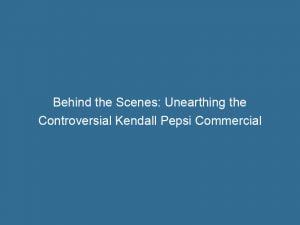- kendall pepsi commercial
- 1. Controversial Kendall Pepsi Commercial Stirs Widespread Condemnation
- 2. Criticism Of Pepsi’s Ad For Appropriating The Black Lives Matter Movement
- 3. Jenner’s Involvement In The Protest March In Pepsi’s Ad Sparks Backlash
- 4. Protesters Portrayed As Joyful Dancers With Placards In Pepsi’s Controversial Ad
- 5. Jenner’s Controversial Act Of Handing A Can Of Pepsi To A Police Officer
- 6. Pepsi’s Apology Fails To Satisfy Activists
- 7. Social Media Backlash And Calls For A Pepsi Boycott
- 8. Pepsi Accused Of Trivializing And Exploiting Serious Movements For Profit
In a world where social activism is becoming increasingly prevalent, the power of advertisements has grown exponentially. Few commercials have caused as much controversy and backlash as the now-infamous KendallJennerPepsicommercial.
This gripping ad sent shockwaves through society, as it attempted to co-opt the powerful Black Lives Matter movement for the sake of selling a soft drink. Join me as we delve into the depths of this ill-conceived campaign, exploring the fervent debate it ignited and the subsequent fallout that left Pepsi scrambling for redemption.
Brace yourself for a journey filled with heated discourse, powerful implications, and a lesson in the importance of responsible marketing.
| Item | Details |
|---|---|
| Topic | Behind the Scenes: Unearthing the Controversial Kendall Pepsi Commercial |
| Category | Ads |
| Key takeaway | In a world where social activism is becoming increasingly prevalent, the power of advertisements has grown exponentially. |
| Last updated | December 27, 2025 |
commercial">kendall pepsi commercial
The Kendall Jenner Pepsi commercial was a highly controversial advertisement that ultimately faced widespread condemnation and was pulled by the company. The ad received criticism for appropriating the Black Lives Matter movement, as it depicted Jenner abandoning a photo shoot to join a protest march.
Fresh look at global CPC and CPM benchmarks.
The protesters in the ad were shown as happy and break-dancing, with placards reading “peace” and “love.” One of the most criticized scenes in the ad was when Jenner handed a can of Pepsi to a police officer, which many believed trivialized the serious nature of the movement. Pepsi’s apology was deemed inadequate by activists, and the ad drew scathing criticism on social media.
Calls for a boycott of Pepsi products were also made. Despite Pepsi stating that they meant no disrespect and believed in the legacy of Dr.
King and others who fight for justice, the ad was widely seen as trivializing and appropriating real moments of protest for commercial gain. Overall, the Kendall Jenner Pepsi commercial was regarded as a major misstep in advertising, similar to the 1971 Coke ad “Hilltop,” as it aimed to capitalize on societal tension and protests without truly understanding or respecting their significance.Key Points:
- The Kendall Jenner Pepsi commercial faced widespread condemnation and was pulled by the company due to controversy.
- The ad was criticized for appropriating the Black Lives Matter movement by depicting Jenner joining a protest march.
- The protesters in the ad were shown as happy and break-dancing with peace and love placards.
- The scene where Jenner handed a can of Pepsi to a police officer was heavily criticized for trivializing the movement.
- Pepsi’s apology was considered inadequate, and the ad received scathing criticism on social media.
- Calls for a boycott of Pepsi products were made, as the ad was seen as trivializing and appropriating protests for commercial gain.
Sources
https://time.com/4726500/pepsi-ad-kendall-jenner/
https://www.nbcnews.com/news/nbcblk/pepsi-ad-kendall-jenner-echoes-black-lives-matter-sparks-anger-n742811
https://www.youtube.com/watch?v=bTivpgMkGKA
https://astute.co/pepsi-kendall-jenner-commercial/
Check this out:
💡 Pro Tips:
1. The controversial Pepsi ad featuring Kendall Jenner received widespread condemnation for appropriating the Black Lives Matter movement and trivializing its message.
2. Activists and critics found Pepsi’s apology for the ad to be inadequate and insincere.
3. Social media played a significant role in amplifying the scathing criticism of the ad, with many individuals expressing their outrage and calling for a boycott of Pepsi products.
4. The final scene of the ad, in which Jenner hands a can of Pepsi to a police officer, was seen by many as a reference to a famous photograph from a Black Lives Matter protest, further fueling the backlash.
5. Pepsi’s use of political messaging in their advertisements, aimed at conveying virtue and social consciousness, has become a recent trend in the advertising industry.
1. Controversial Kendall Pepsi Commercial Stirs Widespread Condemnation
In a move that sparked intense backlash and criticism, Kendall Jenner starred in a controversial Pepsi commercial that was released by the beverage giant. Almost immediately after its release, the ad faced widespread condemnation from various groups and individuals.
The backlash came from all corners, highlighting the concerns and outrage over the insensitivity of using real-world issues for commercial gain.
2. Criticism Of Pepsi’s Ad For Appropriating The Black Lives Matter Movement
One of the main grievances surrounding the Kendall Jenner Pepsi commercial was the accusation that Pepsi was appropriating the Black Lives Matter movement, a movement focused on ending systemic racism and police violence against Black communities. Critics argued that Pepsi’s attempt to align their brand with such a powerful movement in a trivial and exploitative manner was disrespectful and insensitive.
3. Jenner’s Involvement In The Protest March In Pepsi’s Ad Sparks Backlash
The ad depicts Kendall Jenner abandoning a photo shoot to join a protest march, an act many found incongruous with her celebrity status. Critics argued that the casting of Jenner, a member of the Kardashian-Jenner family known for their wealth and privilege, undermined the authenticity of the commercial and trivialized the struggles faced by protesters.
4. Protesters Portrayed As Joyful Dancers With Placards In Pepsi’s Controversial Ad
Throughout the Pepsi commercial, the protesters are portrayed as jubilant and upbeat, even breaking into dance routines with their colorful placards that read “peace” and “love.” This portrayal drew criticism for its perceived attempt to sanitize and romanticize the real struggles that occur during protests, reducing them to mere spectacles of entertainment rather than moments of genuine activism.
5. Jenner’s Controversial Act Of Handing A Can Of Pepsi To A Police Officer
Perhaps the most widely criticized moment in the commercial occurs when Kendall Jenner hands a can of Pepsi to a police officer, seemingly resolving the tension between the police and protesters. This scene drew immediate comparisons to a powerful photograph of Ieshia Evans during a Black Lives Matter protest, creating further outrage and accusations of exploiting real moments of tension for commercial gain.
6. Pepsi’s Apology Fails To Satisfy Activists
In response to the mounting criticism, Pepsi issued an apology stating that they did not intend to disrespect any specific movement or cause. However, many activists and members of the public found the apology to be insufficient and insincere.
Critics argued that a simple apology could not undo the harm caused by the commercial, particularly when it appeared to trivialize and exploit serious social justice movements.
7. Social Media Backlash And Calls For A Pepsi Boycott
The backlash against the Kendall Jenner Pepsi commercial reached a fever pitch on social media platforms. Users took to Twitter, Facebook, and other platforms to express their disappointment and outrage over Pepsi’s poor judgment and appropriation of social justice causes.
Key figures in the civil rights movement, like activist Bernice King, criticized the ad, further fueling the public backlash. Calls for a boycott of Pepsi products quickly gained traction, with users urging others to abstain from supporting a company that was perceived to be capitalizing on the struggles of marginalized communities.
8. Pepsi Accused Of Trivializing And Exploiting Serious Movements For Profit
In the wake of the Kendall Jenner Pepsi commercial controversy, the larger issue at hand became the accusation that Pepsi, as a corporation, was guilty of trivializing and exploiting serious social justice movements for profit. Many argued that the ad reduced profound moments of protest and resistance to shallow imagery used to sell a soft drink.
Comparisons were made to a similar advertising strategy employed by Coca-Cola in their 1971 ad “Hilltop,” which attempted to portray unity and peace but also faced criticism for its shallow messaging.
In conclusion, the release of the Kendall Jenner Pepsi commercial ignited a firestorm of condemnation and criticism. The ad was seen as an egregious example of the trivialization and exploitation of real-world issues for commercial gain, particularly in relation to the Black Lives Matter movement.
Pepsi’s apology was met with skepticism, and the widespread backlash on social media fueled calls for a boycott. This controversy has brought into question the ethics of using powerful societal movements as marketing tools, and there is a growing demand for greater sensitivity and awareness from corporations when engaging with social justice issues.
Buy Traffic • Performance Marketing Tips • Native Ad Network • Advertising Platform for Marketers









